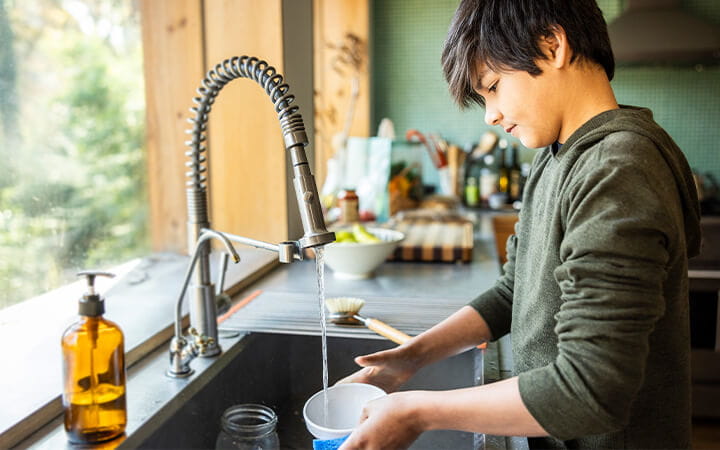Chores Are Good for Kids: Here’s Why
July 18, 2025
 University Hospitals Rainbow Babies & Children'sExperts in Children's Health
University Hospitals Rainbow Babies & Children'sExperts in Children's Health

Between soccer practices, music lessons and school commitments, many families find themselves questioning whether there’s time or even a need for their children to do chores at home. But according to Elizabeth Harris, PhD, a child and adolescent psychologist at University Hospitals, asking kids to pitch in around the house can have powerful lifelong benefits.
“Chores aren’t just about keeping a clean home,” says Dr. Harris. “They help children build confidence, empathy, emotional regulation and executive functioning. These are skills that serve them well, far into adulthood.”
The Science Behind Responsibility
The Harvard Study of Adult Development, one of the longest studies ever conducted, found that children who were given age-appropriate chores developed stronger relationships, a better work ethic and higher life satisfaction as adults.
Dr. Harris says the benefits go even deeper. “One thing that often surprises parents is how chores build empathy,” she explains. “When kids understand what it takes to maintain a home, they become more aware of—and grateful for—what others do for them. That kind of perspective can be a game-changer in emotional development.”
Chores also reinforce structure. “During the school year, kids thrive on routine,” says Dr. Harris. “But in the summer, that structure often disappears. Adding a few regular responsibilities, especially ones the child helps choose, can provide much-needed rhythm and stability.”
Building a Better Brain
Assigning regular household duties can also enhance children’s cognitive development. According to Dr. Harris, chores strengthen executive functioning – the brain’s ability to plan, focus, switch between tasks and manage time effectively.
“Kids who have chores are typically better self-managers,” she says. “They develop stronger working memory, better emotional regulation and more mental flexibility. These are foundational skills not just for success in school, but in life.”
Setting Expectations, Early
So when should you start? “As early as preschool,” says Dr. Harris. “Younger children love to feel capable. Cleaning up toys or wiping down and setting the table, simple tasks like these foster autonomy.”
For older children and teens, tasks can become more complex: maintaining their room, helping cook meals or even managing pet care. Dr. Harris encourages parents to frame these not as punishments, but as opportunities to grow.
“When kids feel a sense of ownership, they’re more likely to follow through,” she says. “And giving them a say in what they do can go a long way.”
Chores and Mental Health: More Benefits
Chores can also support mental health, particularly for kids and teens dealing with anxiety or depression. “One symptom of depression is lack of motivation, and the best antidote to that is activity,” Dr. Harris explains. “A set routine, even a small, manageable responsibility can help get kids moving and thinking.”
In the case of anxiety, chores can offer a sense of control and predictability. “An anxious brain thrives on structure,” she adds. “Doing something tangible and productive can ease intrusive thoughts and provide a mental reset.”
Finding the Right Balance
Of course, every minute of a typical family life today can be accounted for, leaving parents to wonder whether to insist on chores at all. Dr. Harris acknowledges this tension and encourages flexibility.
“When life gets busy, it’s okay to pull back,” she says. “But when there’s room, lean into those opportunities. Kids don’t need to do everything, but they should do something.”
The bottom line? Giving children and teens consistent, age-appropriate chores is one of the simplest and most effective ways to help them grow into responsible, capable adults. In the process, they’ll gain much more than a clean room. “They gain confidence, agency, and a stronger connection to their family and community,” says Dr. Harris. “And those lessons last a lifetime.”
Related Links
For children and adolescents struggling with anxiety, depression and other emotional challenges, our skilled Child Psychiatry & Psychology team provides compassionate psychological evaluation and treatment services.


